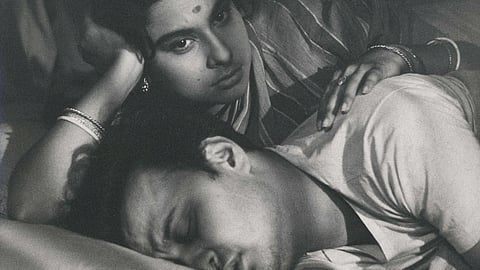
- HOMEGROWN WORLD
- #HGCREATORS
- #HGEXPLORE
- #HGVOICES
- #HGSHOP
- CAREERS
- ABOUT US
- CONTACT US

At a pivotal moment in Satyajit Ray’s ‘Mahanagar’, (The Big City) Arati — the protagonist — asks her husband if she should sign the family name, Mazumdar, with a ‘Z’ or a ‘J’. The pen wavers over the paper in her unsure grip. This isn’t something she’s used to doing. “Use Z,” her husband answers. “As in the first letter of ‘zoo.’” Their pre-adolescent son immediately raises his head and asks, “Who’s going to the zoo?” Subrata, the husband, jovially answers, “We’ll all go to the zoo soon.” Within the span of a few seconds, Ray — masterful storyteller that he was — shows us the impact Arati’s job will have on the financially-struggling family.
Set in the mid-1950s, ‘Mahanagar’, Satyajit Ray’s adaptation of Bengali author Narendranath Mitra’s short story ‘Awbotoronika’, focuses on the lives of Arati, Subrata, their son, Subrata’s sister and his parents, against the backdrop of post-partition Kolkata (then still Calcutta) — a rapidly changing metropolis undergoing unprecedented social, political, and economic change. The film opens with a vignette of the middle-income Mazumdar family as Subrata, a clerk, loses his job and finds it difficult to provide for his family when the bank where he works abruptly shuts down. With some help from Subrata, and much against his parents and the established customs of Bengali middle society, Arati finds a job as a sales representative for sewing machines to provide for her family. Now she is the sole bread-winner. As the film progresses, we see the repercussions this role-reversal has on her and her family.
‘Mahanagar’ is thoroughly and thoughtfully a film about Kolkata — the city and her people — despite being predominantly composed of tight interior shots. By focusing on and revealing the interior lives of these urban middle-income characters who represent the city's lifeblood, Ray captures the tension between the old blood and the new. As industry and trade take over the city (this is pre-de-industrialisation-era Kolkata, remember), Subrata and Arati’s parents — entrenched in ‘Bangali modhyobitto bhodrolok’ (Bengali middle-income gentlemen) morality — struggle to reconcile with the new reality where men and women work and earn equally. It is easy to call the film feminist, but Arati is by no means a ‘feminist’. At one point in the film, she reassures her husband, “Don’t you recognise me? I’m still the same — just a housewife.”
Even outside the confines of domesticity, even when she exerts her agency and stands up for herself and her colleague Edith, Arati remains rooted to her roles as wife, mother, and daughter. Ray doesn’t offer us a vision of feminist rebellion in Arati, who struggles to find a balance between her role as a working woman and a caregiver. Instead, over the course of the film, she's forced to reconcile with her husband’s changing gaze towards her.
As she finds herself in her work and excels at her job, she suffers the indignity of the short end of old-fashioned notions of 'honour'. Ray doesn’t offer Arati or us, any slogan or rhetoric or anthem for feminism. A humanist to the bone, he offers only his own understanding of a woman’s inner life.
In the 60 years since the film’s release, Kolkata — and Indian society at large — has undergone a dramatic transformation. Unlike many other films from the time, however, ‘Mahanagar’ has aged remarkably well. Whether it's the beauty and complexity of marriage, the contradictory realities of a caregiving wife/mother/daughter-in-law and a working woman, or even the contrast between the home and the world — so much has changed, and so much has remained the same.
A 2K digital restoration of Satyajit Ray’s ‘Mahanagar’ (The Big City) is currently showing in select cinemas across the country.
If you enjoyed reading this, here's more from Homegrown:
What Satyajit Ray’s 101-Year Old Legacy Tell Us About The Future Of Indian Cinema
Film Posters Designed By Satyajit Ray – A Peep Into His Lesser-Known Past
Stepping Into A Child's Mind: This Film By Satyajit Ray Offers A Unique Take On AdulteryA Karan Khosla Photo Series Immerses You In A Lush World Of Rural Romanticism
